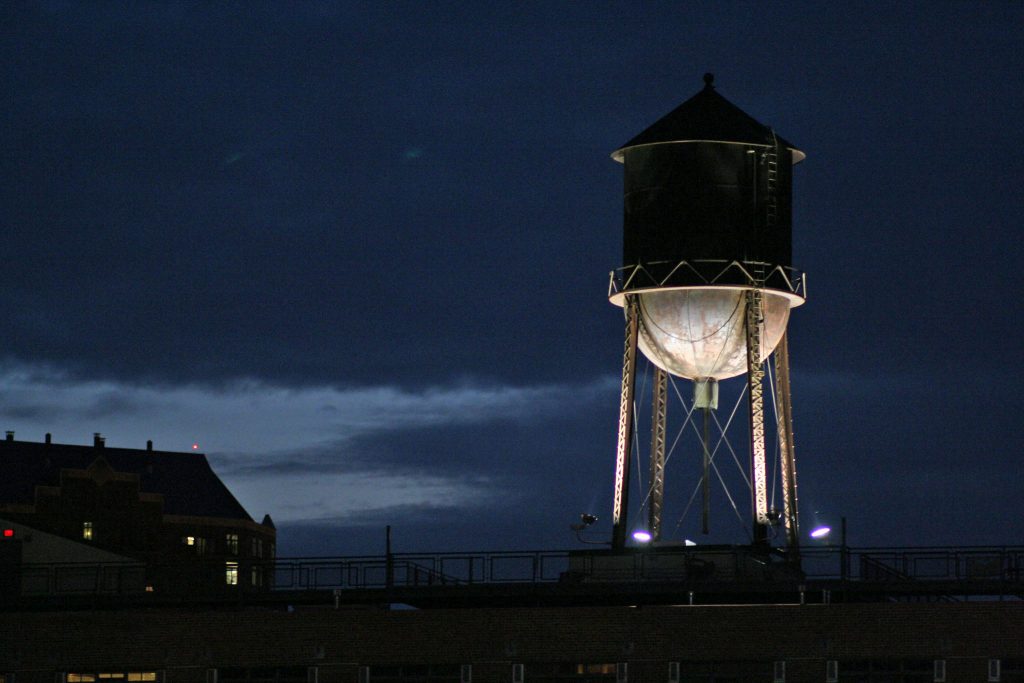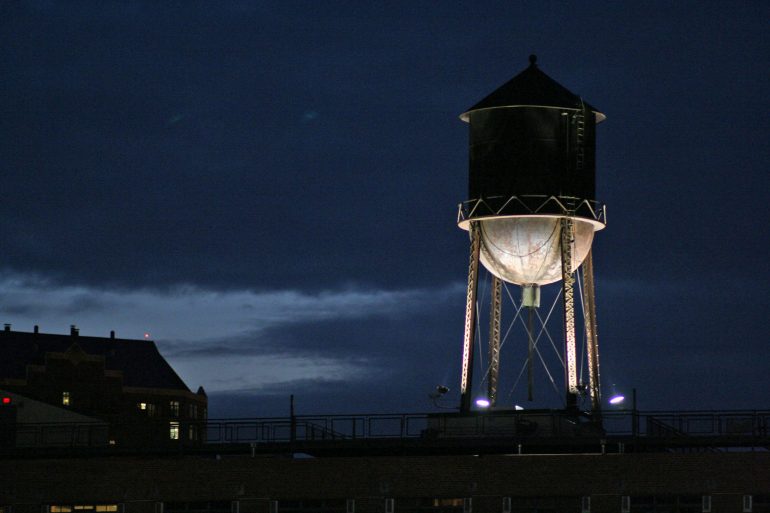Tommy Dean

The night before the new millennium, we set up the tent in the snowy backyard. Our parents wanted us in church, hands growing hot from holding melting candles as the elders prayed and the congregation sang hymns.
We tried to explain our need to be with the natural world without mentioning my brother’s looming deployment. Never mind the buzzing of security lights from the trailer court that abutted our property line or the swish of cars drifting through our single-stoplight town. Leave us alone, we wanted to shout, but that would only unite our parents against us. Space and privacy were conditional freedoms.
Our mother already in the van, our father leaned toward us like a dog caught by a heavy chain. “Whatever your plans are, make sure you’re in the goddamn tent by the time we get home.” He closed the door on our smirks, our reflections in the leaded glass making us laugh.
For weeks we’d carted bottles of water and cheap ramen to the basement, stacking the packages next to jugs of aromatic gas on the mauve carpet. We lit matches, waving them around like sparklers, until the flame touched the tips of our fingers, the blackened match heads disappearing in the deciduous weave of carpet. We expected to live forever.
For an hour we jacked around in the tent, sleeping bags pooling around our waists. Dane sipped from a bottle of Malibu, his lips becoming purple, whispers crackling into shouted impersonations of our father. “By god, goddamn, god-given, god forsaken, god blast it,” his voice arcing into sloppy edges like paint applied in wet, gelatin strokes.
“Do you think Dad loves Him?”
“Who’s him?”
“You know,” I said, bringing my palms together.
“Son, you look like a goddamn monk,” Dane said. “Dad loves Mom. Period. Now drink this or you’ll be cold.”
I wanted to love everyone, take them all into my heart, and put them to bed. Hate was something I didn’t know how to acquire, but Dane was a good teacher.
I took a small sip, my lips already buzzing. “How can you drink this shit?”
“It ain’t for pussies,” he said, unzipping the tent.
“I’m not,” I said, dropping into the folds of my sleeping bag.
Dane loomed over me, smiling, teeth exposed like skin during a paintball match, his eyes dulled marbles. “You’re right, Seth. You ain’t. A whole world full of ’em. But not you. Now get. Otherwise we’re going to miss it.”
The plan was to climb the water tower, see for ourselves the moment of total darkness when all the computers glitched, those numbers never rolling to 2000. For someone who still used a night light, it was hard to imagine. For Dane it was just another challenge, a way to test his resolve, to name something he could do that our father and his teachers would never attempt.
We walked down the middle of side streets for a while, dipping into the shadows whenever we saw someone through their windows, washing dishes, putting kids to bed, dancing in front of a Christmas tree.
We stopped in the back lot of the Methodist church, its back-door glowing, welcoming. We both knew it was unlocked.
“You seen Ashley around?” I asked.
“Let’s just say she ain’t praying for me anymore,” Dane said, his voice brittle. He grabbed the back of my jacket and pulled me in close. “It’s all bullshit, anyway.”
Streetlights buzzed above us as we huddled together, wind finding the hollows of our coats. The occasional car drifted toward us, engines hammering, brakes squeaking as the cars rolled through stop signs. Even on New Year’s Eve, our town couldn’t afford any police officers.
We cut behind the grain elevator, running up a frozen hill dotted with mildewed corn kernels. The one-story apartment buildings painted egg-shell white were streaked with dust from the rusty train cars that rattled through town in the middle of the night.
Dane grabbed me by the arms and threatened to throw me off, but I broke at the knees, driving my shoulder into his ankles. He toppled and skidded down the hill. His breath raced toward the sky, dissipating into the wink of faraway galaxies. He pulled up his coat sleeve ,revealing a Casio watch with glowing digital numbers.
We ran across the tracks, around the bar lit up by fluorescent beer signs and a few security lights before drifting back into the shadows of the narrow side street lined with one-story houses, sentries guarding the entrance to the water tower.
Lights followed the bulbous curve of the tank, pooling under an eight-foot fence. Dane boosted me half-way up the fence and I scrambled over the rest. The drop vibrated through my shoes as I waited for an alarm to go off. Dane landed beside me, feet already moving toward the solo ladder. He flashed me his watch.
“We’ve only got a few minutes to get to the top,” he said, foot poised on the first step. There was something happy but determined about this pose. In the years after he was gone, this was how I liked to remember him: young, capable, solid.
The ladder rattled with each step we took, paint peeling off, looping toward the ground like feathers. I swallowed my questions, focusing all my thoughts on the next rung, the tread of Dane’s boots, the melting snow, a wedged pebble.
Twelve stories later, Dane helped me fit my feet into the narrow groove of the catwalk. Aircraft warning lights strobed the side of Dane’s face as we reeled our breath back into our aching lungs. He reached for my shoulder and I flinched at his image; he looked like one of those horror movie villains pulling their victim toward a flashing blade. He caught me as I wobbled.
“Jesus, Seth. Let’s keep the tragedy to a minimum, yeah?”
“How much time’s left?” I gripped the railing, the cold biting into my uncovered palms, but I refused to let go. The town below was lit in uneven strands of light, most of it submerged in darkness. Like most events during those years, the view wasn’t as impressive as I’d hoped, and regret was seeping in. The thought of climbing down the ladder backwards was worse than the cold.
“Thirty seconds, “he said. “Fucking town is depressing. I don’t know if I can live here another minute.”
We didn’t hold hands or count down. I thought maybe we’d pray, but we huddled together, the sounds of semis air-braking at the stoplight just outside the town line. The Casio faithfully ticked down the seconds until the digits changed to 12:00.
I rubbed my eyes, but the lights below didn’t even flicker. I stomped my feet, trying to get some warmth back into my toes. The catwalk shook, seemed to come alive, threatening to throw us from its back. A car alarm went off near the bar.
“He couldn’t even get this right?” Dane grabbed me by the shoulders, that red light pulsing across his eye, his breath snorting out like a bull’s.
“Well, it’s a miracle, of course,” I said, already apologizing to God, asking for safe travels down the ladder.
“A message from a false prophet, more like it. We’re all fools. Thinking it would just end.”
“Hallelujah,” I shouted. I hoped it would reach Mom and Dad, ashamed I had doubted them.
In answer, the church bells started ringing.
“Christ. You want a miracle? Tell me how we’re going to make it back to the tent before they get home?”
Before I could answer, Dane was already pounding down the ladder, begging me to hurry. My fingers were so cold they didn’t want to bend around the ladder steps.
We ran back through town, Dane several yards ahead of me, my lungs constricting like a popped balloon. He cheered me on in a hushed voice, porch lights blurring. You’ll make a good soldier, I wanted to tell him. The last half-mile he held me up, guiding us not toward our driveway but back through the trailer court, around cracked driveways and flimsy-curtained windows to our backyard. The tent sat upright, darkened, but zipped against the cold. The driveway was empty, our parents still celebrating their miracle at the church.
I stood hunched over, hands slipping from the knees of my jeans while Dane worked at the zipper of the tent. He got me inside, fitting the sleeping bag over my legs and chest. I shivered violently. Dane tucked himself into his own sleeping bag and waddled closer, almost tripping over my feet. Awkwardly, he lay on top of me, the kiss of the sleeping bag fabric swishing like the hiss of a sparkler thrown into a bucket of water. His weight was claustrophobic, like afternoons spent fighting. He always won.
“Is this warmer?” Dane asked.
“Yes,” I stuttered.
“Those lights,” he said, his mouth close to my ear, a warm current in the middle of a lake. “They’re fucking constant. Steady, you know? Like me, Seth. I’m unwavering.”
I shifted, my hands caught against my hips, but Dane didn’t move. “They’ll kill you.”
“I heard him too. See how far his faith goes too, but you can’t believe it.”
“Hallelujah,” I said, lips so close to his cheek they could barely open.
Tommy Dean lives in Indiana with his wife and two children. He is the author of a flash fiction chapbook entitled Special Like the People on TV from Redbird Chapbooks. He is the Editor at Fractured Lit. He has been previously published in the BULL Magazine, The MacGuffin, The Lascaux Review, New World Writing, Pithead Chapel, and New Flash Fiction Review. His story “You’ve Stopped” was chosen by Dan Chaon to be included in Best Microfiction 2019. It will also be included in Best Small Fictions 2019. Find him at @TommyDeanWriter on Twitter.


